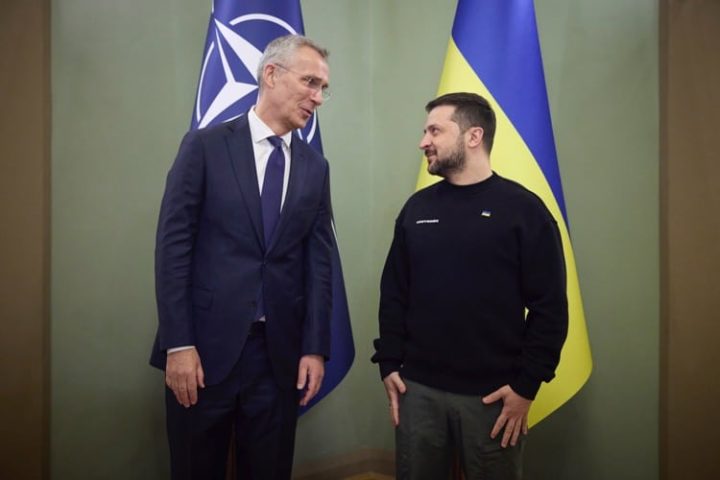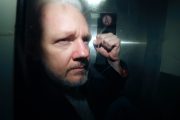
On May 2, German news media outlet Deutsche Presse-Agentur GmbH (dpa) reported that Washington and Berlin were not prepared to make any tangible pledges to Kyiv about Ukraine’s future NATO membership, shattering Kyiv’s aspirations to join the U.S.-led military alliance in the near future.
Based on reports by dpa, major NATO members such as the United States and Germany recently told Kyiv in private that they presently do not wish to make any further promises on Ukraine’s NATO ascendancy, apart from an ambiguous bloc declaration made in 2008.
Back then, the leaders of the NATO member states declared that Ukraine and another former Soviet republic, Georgia, should join the alliance, without offering any timeline for either country to join.
During a recent visit to Kyiv, NATO Secretary General Jens Stoltenberg insisted controversially that “Ukraine’s rightful place is in NATO.” He also proclaimed that “over time, our support will help to make this possible,” but did not provide details as to when Ukraine was to join the bloc.
While in Kyiv, Stoltenberg lauded the continuous military assistance flowing from NATO member states to Ukraine, asserting that a multi-year support initiative for Kyiv was “testament to NATO’s long-term commitment” to the country.
“Allies are now delivering more jets, tanks, and armored vehicles, and NATO’s Ukraine fund is providing urgent support…. All of this is making a real difference on the battlefield today,” Stoltenberg stated.
Ukrainian dictator Volodymyr Zelensky, on his end, encouraged Stoltenberg to “overcome the reluctance” of some NATO members to provide long-range rockets and modern fighter jets to Ukraine.
Nonetheless, German Defense Minister Boris Pistorius subsequently announced that “this is not the time to decide” about Ukraine’s status in NATO. He said this issue could be “carefully” contemplated only after Kyiv succeeds in “repelling this attack.”
NATO members should mull over this issue “with a cool head and a hot heart. Not the other way around,” Pistorius asserted.
Pistorius’ remarks riled Polish Deputy Foreign Minister Piotr Wawrzyk, who maintained that “it’s known that France, Germany, and countries in Western Europe, in general, have always been against Ukraine joining either the EU or NATO.”
Also in response to Stoltenberg’s aforementioned remarks, Hungarian Prime Minister Viktor Orbán tweeted “What?!” as he referenced a link to a Politico article headlined: “Your place is in NATO, alliance chief tells Ukraine on first wartime visit.”
Orbán has expressed doubts on several occasions regarding NATO’s supposedly universal support for accepting Ukrainian membership.
On April 30, Hungarian Foreign Minister Péter Szijjártó decried Zelensky, who has publicly blamed Budapest in a previous interview with Nordic media outlets for behaving “inappropriately” for a NATO member state. The Ukrainian dictator had slammed Budapest for supporting Russia in the ongoing conflict and of regarding NATO as an “adversary” altogether.
“It seems to me that confusion reigns among the Hungarian political elite. This is a very strange situation. Can a NATO country simultaneously be with Russia and against NATO?” Zelensky stated.
It was “fortunately” not for Zelensky to judge Hungary’s behavior, Szijjártó sarcastically mentioned in a Facebook post, while hinting also that Budapest has already given enough support to Kyiv.
“Hungarian people have already paid an extremely high price for this war,” Szijjártó wrote.
“If this statement means ‘I respectfully thank the Hungarians for letting in and taking care of more than a million refugees from Ukraine, and I respectfully thank you for continuously sending aid’ then [the response is] ‘You are welcome and can count on us in the future as well.’”
Hungary has so far adopted a more neutral position on Russo-Ukrainian tensions that culminated in the full-blown military conflict since February 2022. Budapest has objected to EU sanctions against Russia, especially those undermining its own interests, such as limitations in the nuclear and conventional energy sectors. The country has reiterated that it would not back Ukrainian aspirations to join either NATO or the EU. Budapest has thus far avoided sending direct military aid to Kyiv and has refused to permit military shipments to traverse its territory into Ukraine.
Notably, Budapest and Kyiv have longstanding tensions over the latter’s suppression of ethnic Hungarian minorities in Ukraine, mainly those living in the Transcarpathian region. Kyiv’s clampdown attempts on Russian speakers after the 2014 U.S.-backed Maidan coup as well as its Ukrainization efforts have impacted Hungarian minorities in Ukraine too. On its end, Kyiv has accused Budapest of interfering in its internal affairs, especially by granting citizenship to Ukraine’s ethnic Hungarians.
Earlier this week, Gitanas Nausėda, president of NATO member-state Lithuania, said in an interview with Italy’s la Repubblica that it “would be too difficult” to make Ukraine a member of the bloc as long as its conflict with Russia persists, before adding that Kyiv is fully aware of this situation.
Nausėda noted, nevertheless, that a “definite road map” should be outlined by mid-summer for Kyiv’s ultimate membership.
NATO needs to “define stages and formulae of how to act after” the conflict is over, Nausėda proposed, saying that such a blueprint could be done during the NATO summit in Vilnius on July 11 and 12, 2023.
Moreover, the top advisor to Zelensky, Mykhailo Podolyak, has recently highlighted Kyiv’s hopes in joining NATO, alleging that without “the country’s full membership in NATO,” peace and security in Europe would be impossible.
Ukrainian defense minister Oleksii Reznikov also seemed to adopt an optimistic tone and posited, “A year ago, I had an apprehension that the world would experience war fatigue,” Reznikov said. “However, today I may confidently say that there is no fatigue in the West. Our partners unanimously claim that they will be with us until the complete victory of Ukraine.”
“We are already a de facto member of NATO,” Reznikov added. “And I have no doubt we will eventually become a de jure one. From our side we continue a job, for joint fulfillment of which NATO was founded. There is already a high degree of interoperability between our military and NATO systems.”
Moscow, which views NATO’s eastward expansion as a huge security threat, had emphasized Ukraine’s push to join the bloc among its main reasons for launching its so-called special military operation against Kyiv in February last year. Alluding to Stoltenberg’s remarks, Kremlin spokesperson Dmitry Peskov reiterated publicly that stopping Ukraine from becoming a NATO member remains one of the main goals of Russia’s military campaign in Ukraine.



